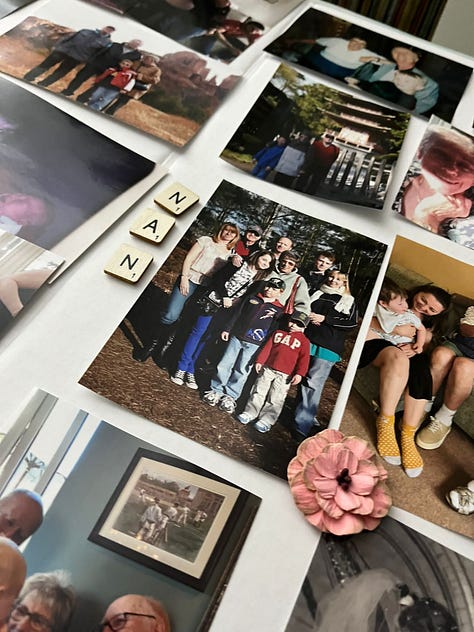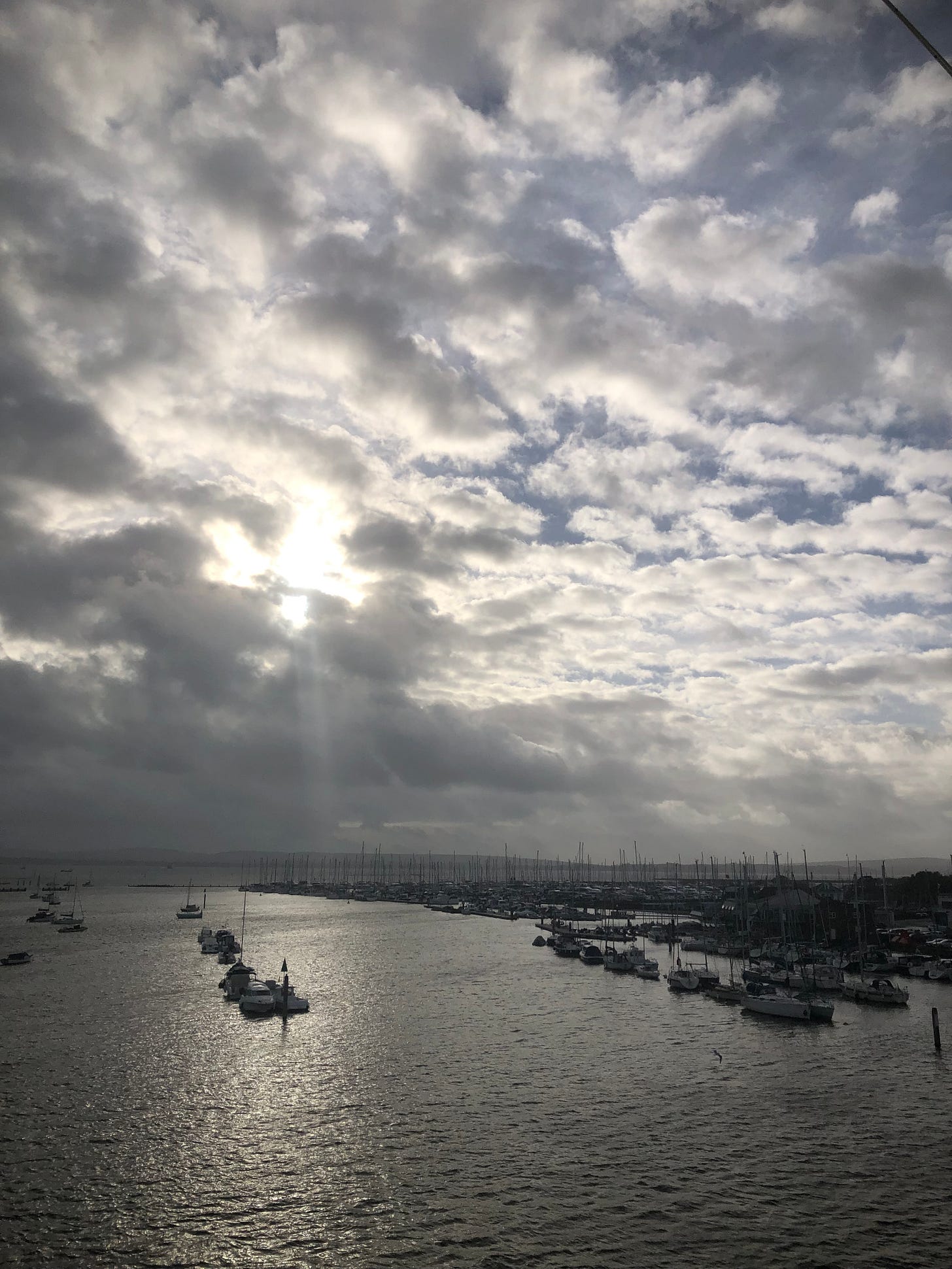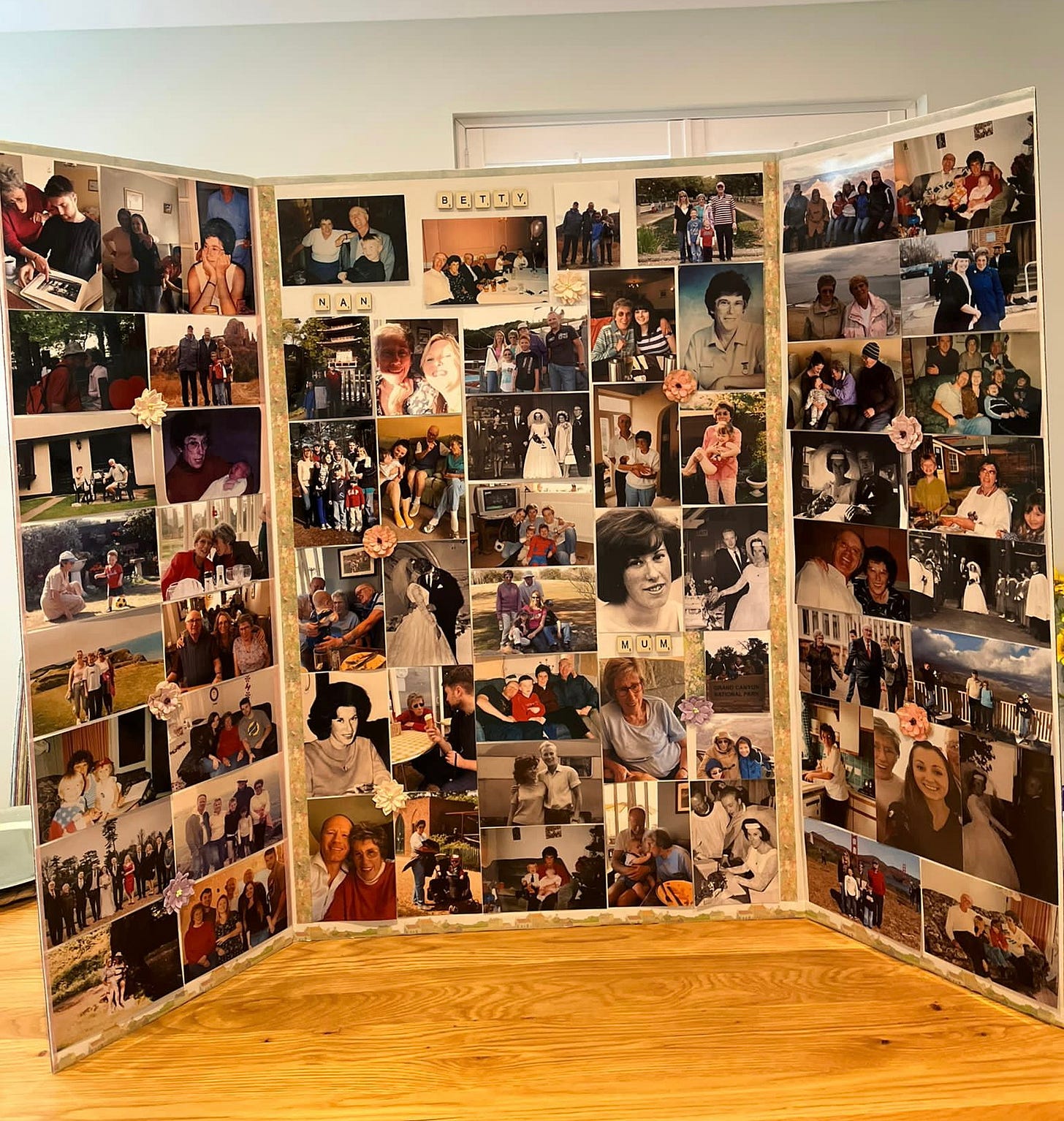journal — fourteen
Hello,
Here are ten things I’d like to remember from the past week.
one
Where are the eyes of my childhood, those fearful eyes she had thirty years ago, the eyes that made me?
Annie Ernaux, from I Remain in Darkness.
In our self-examination, we are neither to blame nor to make excuses for ourselves: we are to try to understand.
Richard Holloway, from Waiting for the Last Bus.
two
From the journal:
two-hour drive, Frome to Lymington. swollen water close to breaching road banks at the dock. clear sky, ferry crossing, stale sandwich, metal water (above), Yarmouth. speeding ticket on drive to (nan &?) grandad’s in Lake. too many crisps & drinks & chocolate for uneasy stomachs — people graze. dad points to a rose for later — i freeze for what to say. two black limos park on a quiet street of bungalows & berries. sister squeezes my hand, just us two sat in the back; she offers a tissue & hand cream: parma violet. i wonder about the etymology of ‘path’: empathy, apathy, pathetic, sympathy. would it be ‘pathetic’ if i read what I’d written & broke down in tears? is there a reason I can see all those words in action today? an atom of a fly headbutts the limo window to reach heavy raindrops on the other side. small wooden box. very small. eulogies fulfil their ultimate cliché: clouds clear & golden sun is summoned. uncle & dad read their words. i don’t — the celebrant, brilliantly, does it for me. ‘i could have cut a chunk of that’, though. grandad reads something short, I forget to listen because the weight is too heavy at that moment; he puts a rose on the box; to an emptying room, he throws out an echo: ‘goodbye, my darling girly’. hasty hugs — no wake for me — we rush for our ferry (within the speed limit). i eat the sandwiches i squirreled earlier. dark pastel clouds & wind whips on the ferry deck. alone, i record myself speaking: how do i feel, just after it all? i write a note that captures it better, which reads: it’s important to let everyone know that they all lost someone today, as they madly go about their lives, without a clue.
three
Pathos, from Greek, means feeling, emotion, experience, generally in the tone of suffering. It roots words like apathy, pathetic, and sympathy; in modern English, it’s a quality that evokes pity, compassion, sadness & (in my experience of hearing / using the word) it’s used as a scornful insult to suggest someone is self-pitying, unimpressive, weak. It’s not a word to use lightly.
Pathetic, self-critic that I am, was what originally floated into my head in that limo: if I read my eulogy & broke down in tears, that’s how I’d look.
In fact, pathos in this case became the Greek pathētikos, or capable of feeling. So, if taken without its more critical tone, perhaps pathetic acts can be seen as more glorious than they are: moments where people see just how much they can feel.
Wasn’t up for testing the theory of how glorious, snotty, cry-reading was on the day, though.
four
Memories are darting little wisps. They fly & run much faster than I can; they darken & blur like patches of fog when cornered. Even those recorded in detail on the day they happened can feel uncertain of their place & time — did that really come first? It matters because one thing influences the next, the next, so it’s good to understand where you & your circumstances have come from, for the destruction / recreation of similar moments in future.
In memories I do pin down & see relatively clearly, the opportunity to be self-critical — to analyse my role in the memory, in anyone’s favour but my own — is snatched, rather than shifting towards the reflective, honest exercise it’s meant to be.
Everything I’ve written above can be diluted down to a feeling that I’m realising how important, how helpful it can be, to look back & understand.
Writing my nan’s eulogy, I tried to remember what I saw through my childhood eyes: what it was really like to have my nan as my nan. I wanted it as close to truth as possible — I briefly mentioned Alzheimer’s (though not directly, and briefly) & her smoking, because they were parts of her, but I found so much more than I expected by giving myself time to remember.
Some of my family asked if I could send what I’d written to them. (Dad suggested we print & frame it for (nan &?) grandad’s home.) I sent it with a caveat: please don’t print or share it further. Doing more with it beyond its intended use would transform it into something self-congratulating, no longer in memorium of nan. It belongs to that day, that hour, as ritual & tribute, and to bring it out of there could crack some boundary, the finality I found in writing it.
The notes I took from the day, though, felt OK. It made me wonder how people who publish their diaries & letters feel about the same kind of thing — I’m not set on this being right, it just makes sense right now. I’m just finding so much richness in this process of recording.
five
Time, folded by my sister.



six
you wandered down the lane & far away
leaving me a song that will not die
love is now the stardust of yesterday
the music of the years gone bysometimes I wonder how I spend
the lonely night
dreaming of a song
the melody haunts my reverie
& I am once again with you
Stardust was originally composed by Hoagy Carmichael with lyrics by Mitchell Parish — it’s been recorded over 1,500 times & translated into 40 languages. Nat King Cole’s cover played as nan was carried into her funeral on Thursday, and is a beautiful example of just one of the contribution of the arts to our lives: it haunts us, and brings us back to the people who are gone.
seven
With the help of a bookseller from Toppings in Bath, and hopefully a trip to Mr B’s Book Emporium this coming week, I’ve found a few books to add to my list of memoir writers.
eight
Bundles of music from the week.
Best of rock album lists — I’m on the hunt.
Books
In this Five Books article, Alex Ross, New Yorker music critic, explains why writing about music is, really, nothing like ‘dancing about architecture’, and shares some well needed reading.
These 60 music books from Pitchfork will be dipped into.
Nan’s funeral music
(carried in) — Stardust by Nat King Cole
(mid-ceremony) — We Have All the Time in the World by Louis Armstrong
(end) — Unforgettable by Nat King Cole
nine
For the coming week, I’ve put aside time to catch up on everything. I’ve not caught up with this ten-things-thing yet — it’s been a difficult few weeks.
ten
the quiet passing of the I
into the vast and
boundless
you.
Maddie Mortimer, from Maps of Our Spectacular Bodies.
This letter takes roughly five hours to write & edit & record each week. If you like what I do, please support me: subscribe for free or a few quid, comment below, forward this letter to someone else, buy me coffee or books, one-off PayPal me, or hire me. Any pennies & pounds I earn are for short story competitions & study.
Thank you — Daniel.




